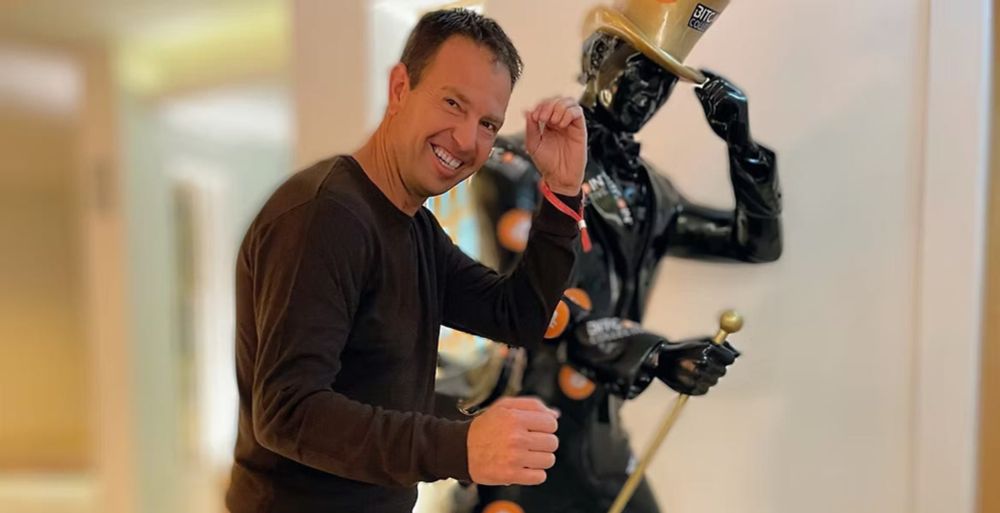
Rosario Ingargiola is Founder/CEO BOSONIC.digital, a San Francisco based Financial Technology and Infrastructure company offering the only non-custodial, real-time clearing and settlement platform in existence. Clients include Banks, Neo Banks, Hedge Funds, Lenders, Market-Makers, Broker-Dealers and Miners.
Rosario Ingargiola is Founder/CEO BOSONIC.digital, a San Francisco based Financial Technology and Infrastructure company offering the only non-custodial, real-time clearing and settlement platform in existence. Clients include Banks, Neo Banks, Hedge Funds, Lenders, Market-Makers, Broker-Dealers and Miners.

Transcription
Pemo: Welcome, Rosario. So good to speak to you again. It’s been a little while and obviously, a lot’s happened all over the world for everyone. So, tell me about your business.
Rosario: Yeah. Well, thanks for having us, Pemo. Appreciate it. Yeah, it’s been a very busy time, despite COVID. Obviously, everybody’s working remote and not doing a whole lot of travel, but on every other aspect of the company, we’re charging hard. So, closed some strategic capital and ramping up the team, and making some real progress on what we consider to be sort of some last mile features, that we’re getting ready to roll out.
Pemo: So tell me more about it, like what you guys actually do, and what you’re involved with.
Rosario: Yeah. Yeah. So probably, I don’t know if you recall from last time I was on one of your panels, we talked a little bit about the core value proposition, which is really the elimination of trading counterparty credit in settlement risk. And so, in plain English, what that means is, we make it possible for anybody to transact with any other liquidity source, any counterparty market makers or exchanges. And, to be able to do that, from the safety and convenience of maintaining the assets in their own custodial account, and with no counterparty credit or settlement risk. And essentially, real time clearing and settlement at the custodial level with all the net settlement movements automated, et cetera.
Pemo: Fantastic. And so, how are you finding things since the elephant in the room launched, the COVID crisis? What’s been happening in the markets? It seems to be going up and down, and boom and bust.
Rosario: Yeah. I mean, oddly, I think it’s, I think there’s COVID has actually kind of helped the whole case for digitization, and crypto generally. I think in fact, I’m looking at the screen right now. I think we’re at a new, all time high in Bitcoin, just as of minutes ago.
Pemo: Great.
Rosario: So there’s certainly a lot of good stuff happening from a crypto perspective. I think for us, it just, it meant a lot of focus, and I think we actually got a lot done despite the pandemic. So, we’re in all new territory, really charging ahead and getting a lot of traction.
Pemo: That’s great. I know there’s been quite a few changes, too. Would you like to talk a little bit about the effect that China banning Bitcoin and cryptocurrencies has had on the markets, do you think?
Rosario: Yeah, I mean, I think, it’s an interesting one. China, of course, I think has been trying to get control of monetary, or get control of money outflows for a long, long time. And so, banning crypto officially, and mining of course, is I think a step in that direction. But it’s interesting if you really look at what they’re doing, they’ve actually created a digital Yuan, which is issued, and managed on blockchain, right? So they’re really moving towards essentially having a Central Bank digital currency or their own. Sort of state owned cryptocurrency, if you want to think about it that way, which obviously is going to give them a tremendous amount of control over monetary flows. So, I think, it’s been an interesting development. It’s net positive for the United States, because I think now the United States has got, I think it’s actually the leader in hashing power now on the network. Which in, I think by most people’s standards, probably reduces the overall risk to the Bitcoin network, given that it’s now not centralized in China.
Pemo: So obviously then, the point of the exercise on China’s part was really more to control the currency, which they couldn’t so much with Bitcoin, and crypto. Is that correct? Am I correct?
Rosario: Yeah, I think that’s it. It certainly seems like that’s one of the primary motivations around it.
Pemo: Okay. And obviously the other interesting thing that’s happened recently is El Salvador taking on Bitcoin as a currency. Obviously, the US dollar is their main currency. How do you feel about that? And, do you think that that’s really going to contribute to the ecosystem, having a country using it like that?
Rosario: I think it’s certainly a pretty incredible development. I figured it would happen eventually. I think it happened sooner than anybody would’ve thought. And I think there certainly will be copycats, I think, in the developing world. What it really means is, remains to be seen. And, I think it poses a lot of questions with respect to the IMF, and all sorts of sort of geopolitical and geo financial implications, potentially. And I’m not an expert in that area, but it’s obviously a pretty fascinating development.
Pemo: It’s a real experiment in that domain, I would say. Definitely. And also, I see recently that the federal government now has now got the power to tax crypto with the new laws that are coming in. So, how does that affect us all generally? Is it going to affect your company in any way?
Rosario: Yeah, I mean, I think, it’s a good question. I mean, obviously, it’ll have a big impact on, I guess for maybe more of the fringe element, frankly. I mean, I think most of the firms that we cater to are real institutional firms, that are mostly involved in short term trading and obviously, doing everything by the book, as it were. So, I’m not sure it has a huge impact on us as a company, or on our general clients. But, I think it does have implications around all those holders and folks that are borrowing against those assets, and maybe thinking they’re going to ultimately get around some of the gains.
Pemo: And in your company, you’re obviously dealing with other companies, correct? You’re not dealing with individuals, from what I gather, when we’ve had past conversations.
Rosario: Yeah, that’s right. We’re currently strictly B2B. So we sell to hedge funds, and banks, and folks like that, exchanges. And, I think ultimately we’ll have some, we’ll be able to touch retail, but only after we finish up with some of our regulatory roadmap.
Pemo: Okay. So how do you feel, or how do you see the landscape? I’ve just noted a lot, obviously being in the media side of things, that a lot of the customer service lines to places like Coinbase and stuff, basically don’t really serve the public or their customers. And I’m just wondering, what’s that all about? I mean, I guess it’s nothing new, having been involved in startup world for so many years, but I am a bit shocked because this is people’s money, obviously. And I heard of a few people losing money, and basically could not even get any responses from, Coinbase was the one that was mentioned, but apparently there’s a few others.
Rosario: Yeah. I mean, I think it’s a combination of things. A lot of it is the usual, you have a massive, massive client base, and there’s going to be some subset of those clients that are going to have things to say, and are going to not have a great experience. But I think, for me, our position is that really, that the changes ought to not be custodial. Right? I mean, that’s kind of the point of the technology we bring to bear. So, we’re sort of hyper focused on investor protections, and offer our way for exchanges to maintain client assets at neutral regulated third party custodians, while still performing their function and offering their service. And we think that, that’s probably where the regulatory headwinds are going. And, we think that’ll ultimately be better for everybody. Either that, or we need a whole lot more disclosure around what goes on inside of some of these exchanges, in terms of the trading that happens. So, that’s kind of our two cents.
Pemo: Yeah. Well, that’s very interesting. And, encouraging to hear your perspective and what your focus is, because obviously there’s been a long history of problems with some of the crypto exchanges. Definitely, that Canadian one in 2019, I think it was, was a bit terrifying to hear everyone lost money on that. So I guess really, my focus would be to want to bring much more stability and safety to people, to be able to use cryptocurrencies and have some sort of structure. And obviously, that means, equals regulation, particularly in the US. So what are your thoughts on that? How do you see things heading?
Rosario: Well, it certainly seems like the regulators have not even begun to sort of really take the actions that I think they’re intimating are coming. There’s a lot of question about whether or not any exchange that’s operating in the United States, that’s trading more than Bitcoin and Ethereum, meaning any of the other crypto assets, whether they ought to be regulated as a broker dealer and an ATS. There’s a lot of, sort of open questions, and a lot of people that sort of maybe put the cart before the horse, or took the approach that they were going to basically do what they needed to do, and ask for forgiveness later. But, I think, that’s going to bite a lot of people.
Pemo: Interesting business ploy, isn’t it?
Rosario: Yeah. Well, it’s really, it’s hard to do that, when you’re dealing with regulations that are designed to protect the investor public, right? Exchanges have done a great job of making it easy for people to access cryptocurrencies. And I think that’s where a lot of their value is. I think, but and obviously as they get bigger and more institutionalized, like if you look at the size of Coinbase, obviously there’s some comfort that comes from having a firm that’s that size, and has that size balance sheet, and so forth. But, globally speaking, I think it’s highly unusual to have exchanges custody-ing client assets.
And I think there’s a lot of questions about what kind of trading is happening on those exchanges, and whether or not there are affiliated market makers, market making on those exchanges. And, in the FX days, the exchanges actually, retail crypto exchanges look a lot like FX retail brokers in many respects. And, anybody that knows that space, knows the kind of things that used to go on, on a small basis in the retail FX space. So, one has to wonder if there’s that sort of thing going on here as well, and hopefully there’ll be more regulation, and more disclosures around sort of-
Pemo: Transparency, yeah.
Rosario: … activities like that, absolutely.
Pemo: Yeah. Wow. Very interesting. And just before we wind it up, I was just wondering what your prediction is about where things are headed? Obviously, like you said, Bitcoin’s actually trading really well at the moment, really high. What do you think’s going to happen in the next 12 months or so? Obviously, we’re still struggling and dealing with COVID. So, and that seems to have helped the whole domain, blockchain-crypto domain.
Rosario: Yeah, I mean, I think the most interesting developments right now are probably happening around the DeFi space. And I think that will continue. I think what’s fascinating is that even though it’s very immature at the moment, we still see losses north of a hundred million dollars from hacks, left, right, and center. The reality of being able to deliver a financial service, where you sort of have a crowdsourced balance sheet, if you will, backing some of the activity, things like that are really, really powerful. And I think eventually they will mature, and they will take over a large swath of, sort of what we currently think about as banking services. And hopefully, it’ll democratize and make a lot of those things more accessible to more people. But, I don’t think it’s a flash in the pan, and I think it’s also very clear, one other sort of macro trend. I mean, this is really just the beginning of institutional adoption. I don’t even think it’s actually really begun.
So now, we’re seeing just incredible interest and very, very large, traditional Wall Street firms saying things to us like, “Now, the asset class is too large to ignore,” et cetera. So, I think that means we’re in for an extended run for quite some time. And, I think there’s just a tremendous amount of utility. I don’t think it’s about any particular asset and how it trades. I think it’s just the actual utility of things like Bitcoin, and things like Ethereum, and what you can build on top of Ethereum. So, it’s very exciting times.
Pemo: Fantastic. And so good to talk to you again, Rosario. All the best with the business, and hopefully we can check in somewhere down the line to see how it’s all going.
Rosario: Thanks, Pemo. Appreciate it. Nice chatting with you.
Pemo: Appreciate your contribution. Thank you.
Rosario: Bye.

















